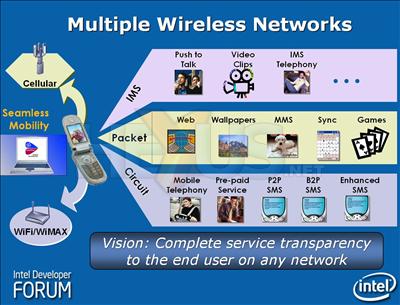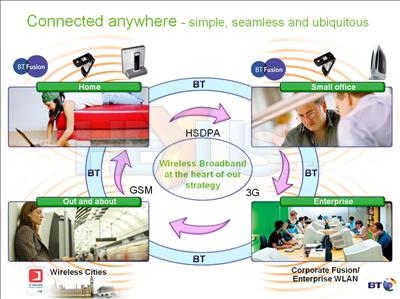The greatest benefits of wireless communication are ease of use and availability, something we all enjoy with mobile phones. But as our demands on wireless communication grow, failings appear.
Take WiFi. Home wireless networking is good, but not great. There are security and setup issues, not to mention range and interference. Then there's interoperability. Can your mobile phone access your computer network? Thought not.
Alan Crouch, Director of Intel's Communications Technology Lab, gave an IDF presentation on Monday, covering Intel's aims with wireless technology.
Ethnography
It's becoming clear now that people have a pretty good idea of how they want stuff to work. So Intel's been doing ethnographic research, looking at user behaviour and working out how to improve wireless technology to meet user needs.
The startling outcome appears to be that people want easy access, secure, fast, on demand features. It's about freedom; being able to do what we want, when we want, wherever we want.
So many standards
If we say 'think wireless' you probably think WiFi, but there's more to it than that. What about WiMAX, GSM, Bluetooth and 3G technologies? There all out there and they're all being used to one degree or another, often by different devices of for different purposes.
Intel wants to see devices that can use most, if not all of these different (and specialised) wireless technologies, in a way that's transparent to the user. We shouldn't need to worry about wether our data is packet switched or sent over a circuit, or whether WiMAX or WiFi is being used, should we?
Of course, service providers still need means of charging for services, and we need to know what we're paying for and when something'll cost us. That means changes to more than just the technology on the phones. Networks will need to be scalable to handle the richer content being delivered to mobile device and to provide and manage available services in a workable manner. Collaboration will be required for this.
It's good to talk... and stuff
BT had something a bit more substantial than a name-drop in Crouch's presentation. Intel's working closely with a number of companies on wireless technologies and BT is one of them.
Familiar to our UK readers will be BT Fusion, a technology where a Fusion phone will use VoIP when it's near its base station, or GSM mobile communications when it's not. BT wants Fusion in the home, the office and the enterprise, creating seamless connectivity... just what Intel wants, too.
BT doesn't have a GSM or 3G network of its own, so they'd become a mobile roaming partner, meaning they're not tied down to one mobile network, which sounds like a winning solution.
They're also planning to roll out wireless networking in 12 cities, part of the 21CN (21st Century Network) they're building.
We already have lots of wireless standards in use, and we're going to have more, but with collaboration, companies will (Intel says, and we hope) provide services seamlessly over these mobile standards.















